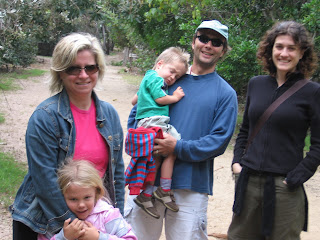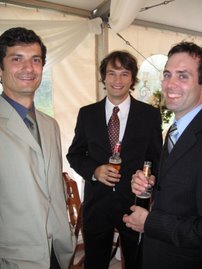
Tuesday, August 21, 2007
Friday, April 20, 2007
Pope revises 'limbo' for babies
VATICAN CITY - Pope Bendict XVI has revised traditional Roman Catholic teaching on so-called "limbo," approving a church report released Friday that said there was reason to hope that babies who die without baptism can go to heaven.
Benedict approved the findings of the International Theological Commission, which issued its long-awaited document on limbo on Origins, the documentary service of Catholic News Service, the news agency of the American Bishop's Conference.
"We can say we have many reasons to hope that there is salvation for these babies," the Rev. Luis Ladaria, a Jesuit who is the commission's secretary-general, told The Associated Press.
Although Catholics have long believed that children who die without being baptized are with original sin and thus excluded from heaven, the church has no formal doctrine on the matter. Theologians have long taught, however, that such children enjoy an eternal state of perfect natural happiness, a state commonly called limbo, but without being in communion with God.
Pope John Paul II and Benedict had urged further study on limbo, in part because of "the pressing pastoral needs" sparked by the increase in abortion and the growing number of children who die without being baptized, the report said.In the document, the commission said there were "serious theological and liturgical grounds for hope that unbaptized infants who die will be saved and brought into eternal happiness."
It stressed, however, that "these are reasons for prayerful hope, rather than grounds for sure knowledge."
Thursday, April 19, 2007
reflections on the economy and values
Yes. The economy is a collection of choices that are inter-related because each choice can have an effect on other choices, and entire collections of choices make collective movements of choices. That's why the economy depends a lot on mood.
But mood also depends a lot on the economy. If our choices are seen as limited by the economy then the economy has begun to structure individual and collective units of people. So if the economy is a collective of choices and these choices create moods and moods affect the perception of choice, then humanity has to struggle to change the economy's structure by changing its choices and thereby changing humanity's mood. That's why there should be a "positive" relationship between "work" and "mood", a struggle leads to positive change.
In other words, some might say that the economy ultimately depends on the natural world (see for example Worster's Nature's Economy) and while this is true in a biological sense (our ability to stay alive) what we mean by "the natural world" changes, in fact its meanings are nearly limitless. So, yes, we have to eat; but there are a range of choices that shape and impact on how we eat:
- what we eat varies cross-culturally
- depends on the economy
- depends on how we manage the economy
- depends on how our management affects other factors
You can see that finding a balance between the choice/constraint experience of being alive is itself part of a choice/constraint reality in which each of us struggles to make the "right" choices.
And we choose to struggle to convince others to make certain choices too. That is how I'm seeing the world now.
We've got everything, but we do nothing? What qualifies as doing something? Do I believe that putting together assumptions qualifies as work? What is work? Do you have to get paid? Could I get paid? What would happen if I didnt'?
These questions help us understand the psychological impact of the economy on the choices we perceive and the choices we make. The above questions are ones I've asked myself as I sit here at home planning my time, juggling an 18hr/week contract at Ryerson U and thinking about career options. What "careers" do I perceive and how "successful" will I be trying to achieve these? The answers to these questions depend a lot on my mood, the choices I perceive, the actions I take and the reactions of others.
But I'm not just talking about getting a job; I'm talking about what kind of work needs to be done and the possibilities of doing it.
Technology
Technology is an issue that affects the economy (mood and choices). It is an example of an issue caught within a tension between creating positive change and steering change without any positive impact on mood (besides short term financial gain). Technology always has its foot in the door: whether its the laptop you work with, the recording equipment, the desk, chair, or plasma TV --- all of these things have been created and improved by technology. But is making better computers, desks, chairs, music, TVs etc. the most important work that humanity has to do? Its importance is, however, evidence of how the economy, the work-mood-choice complex, is structuring our lives and our economies in particular ways that do not match our priorities, or at least what I would argue should be our priorities. Here are some contrasts:
$military spending vs. $Health care
$education vs. $Hollywood cinema
And technology is part of all of these budgets. So it is not that technology is not needed, but that the direction of technological research and its application must fit with the kind of work that needs to happen, not just the kind of work that creates profit.
So is the economy necessarily profit seeking or can it play a role in supporting our values? What counts as profit? Commodification means that anything can be turned into money, and if money is all we consider profit then we either commodify in ways that support our values or we commodify in ways that don't. If we choose the latter option our mood will likely suffer (even if there are some short term gains). If we choose the former, then we believe there is a possibility that the economy can shift in a positive way--a way that supports our values and can make our moods better over time. We can reinvent the economy.
Values
Values are a big part of this thinking about the economy. It would seem that we need a consensus on what is valued, indeed, on who "we" are. This is at first a daunting necessity, so much so that I ask myself: is it a necessity? What would be the implication of considering consensus a necessity for changing the work-mood-choice complex? Consensus can take different forms that range from "complete agreement" (rarely feasible) to "willing to play along." And consensus is not final: it can change over time. But it is the possibility of change that keeps a consensus on values worth pursuing: so long as the changes "we" accept are the ones that support our values.
Education
What I have described so far has some parallels with higher education. According to the educational developers George Kuh and associates, universities require a mission, operating philosophy, a common culture, measures of success and accountability. In other words, there are principles that can guide how universities see themselves and steer themselves. Can governments play a similar role steering the economy?
Music and popular culture
I'd like to talk a bit about indie rock music, some of the themes I see, and their ties to changing the economy's mood-work-choice complex in positive ways. Take Belle & Sebastian and the song "Century of Fakers"....
Friday, April 13, 2007
Sondre Lerche and the Faces Down
When I saw that all the tables were taken, I went outside to find some food. Walking out of the Mod Club doors there was Sondre next to his tour bus chatting with a couple fans. I wished I had a pen and paper, but I didnt' and I moved on to a pastry store for a bite to eat. Then I went back for the openers, who were terrific, one of them was also Norwegian, both just single acts, a guy and a guitar. This, along with the Chicago mix playing in between acts, was the perfect set-up for what came next.
Marta joined me at this point, coming from her flamenco class. I was expecting a jazzy, bluesy show; the mood was mellow, but very captivated from the awesome opening performances. The roadies spent what seemed ages to get all the mics set-up right.
Sondre and the band came on and raised the mood from mellow to "motorized" in about 3 seconds flat. They were so tight, a break after every third song or so for some quick retuning and smooth talk, and then right into the next number with full-on intensity.
All band members played with virtuoso skill as individuals and as a group - the drummer put on a solo that was like twelve rounds of boxing viewed on fastforward with instant replays of the right and left jabs, body-blows, ending with the knockout punch.
They played a great repertoire of songs - all luck ran out, modern nature, two way monologue, and more! Even their slow songs sounded fast that night~~!! And after all that, Sondre and the band came out to sell T-shirts and give autographs--quite the all-round performance.



